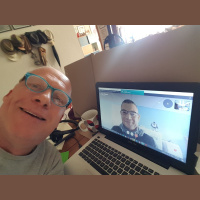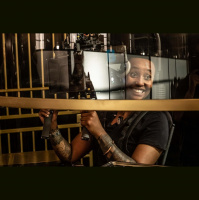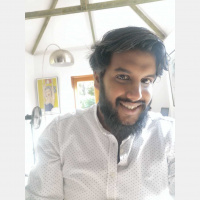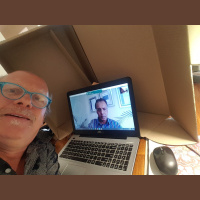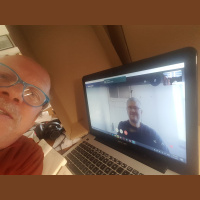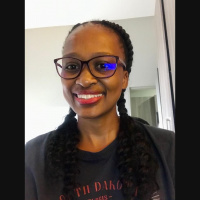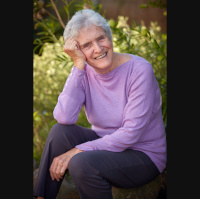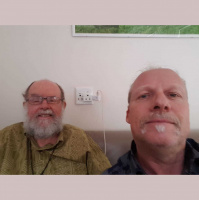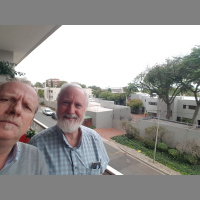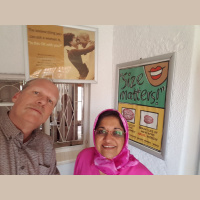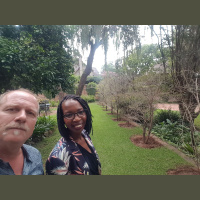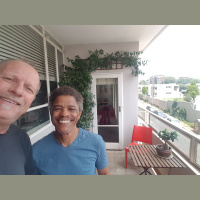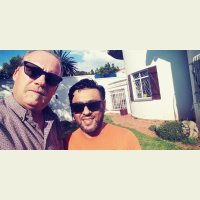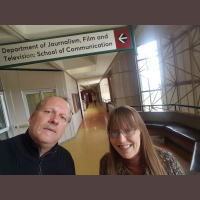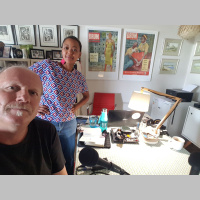Informações:
Sinopse
Interviews with people working in the arts, academia and civil society in South Africa. Listen to new perspectives on issues of race, gender and transformation. The host, Nicholas Claude, is a freelance writer based in Johannesburg. He was born in London, raised in Durban and returned to South Africa in 2010 after living in Stockholm for thirteen years.
Episódios
-
110: Edgar Pieterse-Director, The African Centre for Cities, UCT
12/07/2020 Duração: 01h06minEdgar Pieterse is the director of the African Centre for Cities (ACC) based at the University of Cape Town. He is an urbanist trying to make sense of the sociology, politics, geography and economics of the modern African city. We discussed the often difficult relationship between city governments and national governments, and the ongoing struggle for policy and financial control o the trajectory of cities across sub Saharan Africa. Edgar feels it is necessary for the social, political and economic debate at all levels to be re-imagined if cities are to fulfill their true potential as hubs of national economic growth and social transformation. The bulk of our discussion focused on the Integration Syndicate project hosted by the ACC in Cape Town. The project was an attempt to encourage a different kind of thinking about the issues of urbanisation in Cape Town and which "explores the obstacles and solutions to social-spatial integration in the Cape Town metropolitan region." The five provocations
-
109: Goapie Kabe-Cinematographer
29/06/2020 Duração: 01h06minGoapie Kabe grew up in Soweto, Johannesburg. A school outing to a live recording of a TV show planted a seed that eventually led her to changing plans and studying film instead of engineering. Over the last ten years she has developed into one of South Africa's leading cinematographers. We had a great chat about the art of film-making, the role of the cinematographer in interpreting a director's vision, the importance of pre-production, her love of shooting hand-held, and always having a plan, or three when on set. We also spoke about light and framing, cameras and lenses. She loves technology and so we also spoke about the evolution of camera and lens technology. And we spoke about her role as an inspiration to young black women wanting to break into the film industry.
-
108: Vedhant Maharaj-Architect
31/05/2020 Duração: 01h06minVedhant Maharaj is an architect and head of the Rebel Base Collective architecture and design studio. I recorded this interview a few weeks back and it then got put on the back-burner as I wanted to have some guests on to look at the COVID-19 pandemic and its impact on South Africa. Please listen to the recent episodes with Michael Sachs and Prof Shabir Mahdi. Vedhant and I chatted about a number of things including how he became an architect, the state of South African architecture, the difficulty and challenges of changing the legacy of spatial apartheid and the policy landscape of that debate. We also spoke about the evolving technology of sustainable materials and design, and touched on his masters thesis design project that confronted the challenge of infrastructural and ecological design in the political and religious context of modern India.
-
107: Prof Shabir Madhi-Professor of Vaccinology, and Director of the MRC Respiratory and Meningeal Pathogens Research Unit at University of the WitwatersrandWits.
22/05/2020 Duração: 01h05minProf Madhi has recently co-authored a number of articles about South Africa’s route out of lock down. So we chatted about how this might look. He emphasised the need for people to observe distancing protocols in order to slow the rate of corona virus infection. We chatted about the changing understanding of how corona virus acts on people. We also discussed the reasons behind the lock down and how some of these reason are no longer valid according to Shabir. Another issue we touched on is the spread of corona virus via asymptomatic carriers. Shabir is also concerned that many decisions taken by government have not been based on science. We also discussed the global bun-fight around developing a vaccine. It is clear that we will have to live with corona virus as best we can until a vaccine is available and this process might take years. Read Shabir's latest article about South Africa's COVID-19 strategy here.
-
106: Michael Sachs-Adjunct Professor, Southern Centre for Inequality Studies, University of the Witwatersrand.
15/05/2020 Duração: 01h12minMy guest this week is Michael Sachs, Adjunct Professor at the Southern Centre for Inequality Studies at the University of the Witwatersrand . He has recently co-authored a number of articles looking at the impact of COVID-19 on the South African economy. The articles have not only looked at the health response to the pandemic but also suggested paths to ending the lock down. I spoke to Michael on May 11, 2020. We had a far ranging discussion that looked at the economic impact of the pandemic on South Africa. There are tough times ahead for sure. We chatted about the role of a state that has been incapacitated over the last decade or more, we discussed the separate roles of the Treasury, the Department of Trade, Industry and Economic Development and the Reserve Bank in this crisis. Michael also suggested the government will be forced to take some tough decisions on its role and involvement in certain sectors of the economy such as aviation and energy.
-
105: Erik Esbjörnsson-Africa correspondent, Dagens Nyheter(Swedish national daily newspaper)
20/04/2020 Duração: 01h08minErik Esbjörnsson has been the Africa correspondent for the Swedish daily newspaper Dagens Nyheter since 2010. He spent six years in Nairobi before moving to Johannesburg in 2016. He had an inkling things were about to change in South Africa and Zimbabwe and wanted to be closer to the action. Over the last decade he has traveled all over the continent. His most recent reporting, before the travel ban came into effect, was from Sudan. A few months ago he tracked down his great-grandparents home in Goma while on assignment in the DRC. Of course we spent quite a bit of the podcast discussing a number of different aspects to the corona virus pandemic including the South African government's response, and the seeming breakdown in international solidarity that the pandemic has provoked. We also chatted about Erik's childhood and his path to journalism, as well as some of the highlights of his decade recording events across Africa over the last decade.
-
104: Ndoni Mcunu-Phd student at the Global Change Insitutue, CEO Black Women In Science
05/04/2020 Duração: 01h05minShe is a PhD student at the global change institute at the University of the Witwatersrand. Her PhD is looking at the potential for diversification and scale in small scale farming. Ndoni is also the founder and CEO of Black Women in Science registered non-profit organization which aims to deliver capacity development interventions that target young black women scientists and researchers. In 2016 Ndoni was selected in the Top 200 Mail and Guardian Young South Africans under the education sector. We had a good chat about the potential and possibilities of small scale farming vs large commercial farming. Ndoni pointed out some of the actions required to ensure the success of small scale farmers not only in producing a quality fruit or vegetable, but also support in access and use of technology, good governance and other aspects of building a successful business. Ndoni has been working with satellite imaging technology and so we also chatted about the use of technology in agriculture as well as the need to
-
103: Dr Jackie King-Aquatic Ecologist, Winner 2019 Stockholm Water Prize
25/03/2020 Duração: 01h03minDr Jackie King is an aquatic ecologist specialising in fresh water, that is to say riverine/inland water systems. She is a pioneer in her field and is the winner of the 2019 Stockholm Water Prize. Back in the early 80’s Jackie she and some her colleagues developed a new field of study that today is called environmental flows. In essence this is a set of concepts and methods that provide stakeholders communities and governments with a set of scenarios when they plan the future of a river system. We chatted about the need to find a balance between soft and hard engineering, and we talked about rivers. The Mekong River that runs through South-east Asia for example, and river systems such as the Okavango Delta and some of their incredible characteristics. While she does not describe herself as an activist it is clear she is revered by many around the world for her efforts to harmonise the relationship between humans and the rivers that are so important to life on earth. Read more about Dr King and h
-
102: Africa Podfest virtual panel discussion-"Radio's Place in a Podcasting World."
19/03/2020 Duração: 01h06minThis is a special edition of Voices from SA. A virtual panel discussion arranged by Africa Podfest that I moderated entitled "Radio's Place in a Podcasting World. Africa Podfest was due to take place in Nairobi 12-13 March but was postponed due to the Covid-19 pandemic. This inspired the organisers to organise a range of panel discussions including this one. "This session is about radio, which is where on demand audio came from. In light of the growing crossover between radio and podcasting, we envision a tipping point moment where there will be more interest and investment in podcasts than in radio. If podcasting is to fulfill its potential what are the practical considerations with regard to radio’s place in a growing African podcasting ecosystem which we need to address?" The panelists were: Kameel Stanley, the senior producer of The City, a podcast from USA TODAY that explores how power works in urban American. Kameel is based in St Louis, Missouri Shandukani Mulaudzi, Executive Producer of Podcasts,
-
101: Father Michael Lapsley-Priest, Founder of The Institute for Healing of Memories
04/03/2020 Duração: 01h48sFather Michael Lapsley was born in New Zealand, today he considers himself a citizen of the world. He moved to South Africa in 1973 to continue his training as a priest in an order of the Anglican Church. In 1976 he was sent into exile by the apartheid government. After joining the ANC he spent his time traveling the world mobilising faith communities against apartheid and ministering to South African's living in exile. Three months after the release of Nelson Mandela he was blown up by a letter bomb sent by the Civil Cooperation Bureau, an apartheid era death squad. He lost both hands and an eye in the attack. We talked about his early work ministering to students in South Africa, his journey from pacifist to freedom fighter, the Truth and Reconciliation Commission, and the work of his organisation the Institute for Healing of Memories he founded in 1998. He spoke about how he has become a citizen of the world, his identity shaped by listening to the pain of the human family.
-
100: Obakeng Leseyane-An advocate for access to quality education, founder of Ed Connect Labs
21/02/2020 Duração: 58minAt the age of fourteen Obakeng won a scholarship to the prestigious Bishop's School in Cape Town and his life changed forever. Since then he has studied for his A-levels at the African Leadership Academy in Johannesburg and later this year he begins a degree in economics in the USA. He is a busy young man. Obakeng is an advocate for access to quality education and an ethical public service. He plans to go into government once he has finished his studies as he says he has seen too many friends let down one or another but non-functioning state institutions. But what a cool young man. We chatted about the need to transform the way we think about education in South Africa, the way teach, and the role of schools in their communities. He also spoke about the importance of involving parents education, and the importance of teachers who are inspiring and committed beyond simply teaching the curriculum. Obakeng also spoke about the experience of private schools and how that process detached him in a way from
-
99: John Clarke-Social worker and activist
14/02/2020 Duração: 01h02minJohn Clarke has been working with the Xolobeni community and the Amadiba Crisis Committee for more than a decade in the fight against proposed mining operations by Australian mining company MRC. In this episode John gives an update to the ongoing legal struggles being waged by the Xolobeni community. We also chatted about the state of the world, Jethro Tull and butterflies. John is a man with a calling and it is inspiring to hear him talk about the possibilities of finding a balance between humans, nature and technology. Become a patron and support the growth of Voices from SA here.
-
98: Dr Zubeda Dangor, Director of the Nisaa Institute For Women's Development and Executive Head of the National Shelter Movement.
06/02/2020 Duração: 58minZubeda is a founder, and the director of the Nisaa Institute for Women's Development. The organisation has the goal of "enabling women and children to live in a world free of violence." Nisaa was formed in April 1994. She is also the Executive Head of the National Shelter Movement. In our discussion Zubeda gives a sobering and gritty picture of what it is like working on the front line of the struggle against gender and domestic violence. And we get a sense of the immense work, the thankless and extremely stressful work that is done by social workers, counselors and other members of this vast and unsung network of NPOs and NGOs that work in this field across South Africa. What is startlingly clear is that the government response even at the most basic levels, and that of business for that matter, is sorely lacking. Go here for more information about Nisaa
-
97: Bertha Dlamini-President, Women in Electricity and Power; entrepreneur, consultant,
29/01/2020 Duração: 01h05minBertha is an entrepreneur with interests in the Energy, Transport, Telecommunications and Management Consulting Sectors, delivering solutions and systems for utilities. She is also the President of an NPO, "Women in Electricty and Power" that, quoting from her linkedin profile, aims “ to accelerate the participation of African Women Entrepreneurs in the full value chain of Power and Energy in Africa, and contribute towards addressing the continent’s energy poverty.” We had a great discussion about the importance of mentors in the early stages of her career, affirmative action, some of the challenges facing entrepreneurs in South Africa, and her hopes and dreams for "Women in Electricity and Power", and her belief that women can transform this and many other sectors of the economy across the continent, given the right tools and support.
-
96: Frank Meintjies-Activist
22/01/2020 Duração: 01h12minThis is Frank's third appearance on the podcast. Frank is a former trade unionist and I turn to him when I am looking for a fresh perspective on things. He is incredibly well connected and has some interesting things to say about South Africa and its prospects for the future. We covered a number of areas including the state of the civil service, he reflected on his time working closely with now President Ramaphosa during the struggle against apartheid, the need for trade unions to become more engaged in the debate on economic policy, and some of the things he would do to turn the economy around. Infrastructure, housing and tourism were some of the sectors he suggested would benefit from state investment.
-
95: Richard Poplak-Journalist and filmmaker.
15/01/2020 Duração: 55minRichard is better know to South Africans as journalist at large for the Daily Maverick where he writes under nom de plume Trainspotter. He is recognized for his acerbic wit, biting satire and razor sharp observations that have infuriated and amazed in equal measure over the last ten years. I pitched the discussion as a look at the year ahead and what 2020 night hold for South Africa and its people. Turns out quite a lot. And according to Richard there is not a lot to look forward to. At least in the short term. He says South Africa is facing multiple existential threats. We chatted about a number of things including the civil war racking the ANC, the parlous state of the main opposition parties, and the collapse of Eskom the state-owned power utility. Our discussion did place South Africa in a global context of a post-truth, late-stage capitalism reality where norms of political behavior and activism are being re-written every day. Richard also give some background to the documentary film he
-
94: Ebrahim Fakir-Researcher and Analyst, ASRI
18/12/2019 Duração: 01h13minI had Ebrahim on the podcast earlier this year in the build-up to the national elections. This time he is on the podcast to review some of the significant political events of 2019. We initially had the idea of looking at the elections, the Zondo Commission and South Africa and the BRICS. In the wake of a week of rolling blackouts, we were forced to discuss the state of the power utility ESKOM as a metaphor for the state of our politics. This, in turn, led to a discussion not only about corruption and mismanagement but also the role of consulting firms in the chaos at SOE's. We spent some time as well discussing the broad failure of our political parties to work for the good for the nation and not their own welfare. Ebrahim also gives his political highlight of the year. He also does not have much hope that the Zondo Commission will lead to any high-level prosecutions.
-
93: Professor Jane Duncan, Head of Journalism, Film and TV, University of Johannesburg
11/12/2019 Duração: 01h04minProfessor Jane Duncan is the Head of the Department of Journalism, Film and TV at the University of Johannesburg. She is one of the founders of the Media Policy and Democracy Project and the author of several books inluding "The Rise of the Securocrats" which looks at the growing role of the security services in government policy in South Africa. She has also written extensively about the so-called Fourth Industrial Revolution. She is a skeptic. We discussed a number of issues including the privatisation of public surveillance, surveillance capitalism in general and the gap between policy and technology. Prof Duncan is also keen that South African plays a more active role in spreading our freedoms to the rest of the world to ensure an internet that is open and accessible to all the citizens of the world. Read more about the Media Policy and Democracy Project here. Contract for the Web
-
92: Nomanzi Palesa Shongwe-Filmmaker and teacher
04/12/2019 Duração: 01h12minNomanzi PalesaShongwe is a filmmaker and teacher. Her short film uNomalanga and the Witch won Best Short Film at the Durban International Film Festival (2015), and The Baobab Short Film Prize at Film Africa, UK (2016). It has nearly 500 00 views on youtube Nomanzi grew up in Johannesburg She abandoned her law studies to embark on a career in film. A short film submission led to being awarded a Fulbright Scholarship and she completed a Masters of fine arts in film making at Temple University in Philadelphia. Most recently she was a lecturer at the Wits University Film School. She met Presidents Clinton and Obama as part of different South African delegations to the USA and we chatted about the changing US attitude to the USA over the years. We had a wide-ranging discussion that ranged from her high school years at Parktown Girls High School that straddled the early years of our democracy and the pressure to assimilate that is still being felt by many young professionals in particular today. Nomanzi
-
91: Muitheri Wahome-Investment professional
27/11/2019 Duração: 01h01minMuitheri Wahome has been working in the field of asset management since moving to South Africa from Kenya in 1995. She is currently writing a book about the history of asset management in South Africa. After visiting SA for the first time after the elections in 1994, Muitheri moved to South Africa from Kenya in 1995 to study for an MBA. So she has experienced the ups and downs of post-apartheid South Africa as both a Kenyan and a "new" South African and has some interesting things to say about this experience. She says it is good to take stock of how far we have come in a short time. We spoke a lot about how much has changed particularly within the field of asset management, but also that more needs to be done to transform business overall Muitheri says businesses must create an environment conducive and supportive of transformation. She talks about the importance of enabling environment that looks beyond simply ticking boxes.

